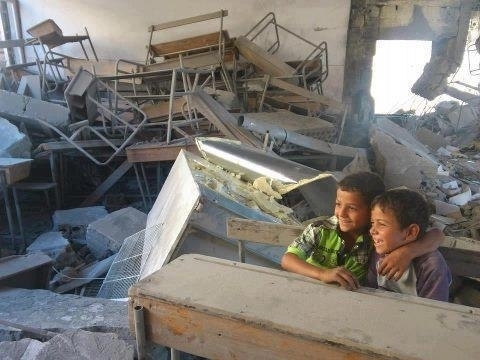With her sunken eyes and a wasted body that whispers exhaustion, Fatima, 13, stood in front of her school, looking at the basement, where all classes now take place due to continuous shelling. She hesitated; the school is no more a place of safety and dreams, to play and to learn. It has become a burden that makes her feel even more tired.
Rubbing her hands from cold, she held back the tears from her trembling eyes.
"That morning scene had captured me," said Noor, the director of the girls educational center in Eastern Ghouta in Damascus countryside, where schools are a regularly targeted with shelling and bombings. The students here are hungry and exhausted.
“Why are you standing here outside of your class?” Noor asked, but Fatima’s eyes held the answer: "I don’t understand anything anymore. I’m not going back to school."
Recounting the scene with sorrow, Noor explained that the number of students had plummeted in the last four months to less than one-third of the original class. She is afraid the school will close if things continue as they are.
She described Fatima’s appearance. Her fingers trembled from a combination of fear, cold, and hunger, like all the other remaining students, Noor said.
“She fell down unconscious yesterday. We knew that she had her first period, she had reached adulthood,” she continued.
“But the weight of this adult is only about 34 kilograms and the symptoms of anemia are unmistakable. This was not an individual case. All the girls are alike.”
That was reflected in their lack of focus and cognitive decline, she added.
“We started to lose everything, the school bell will stop ringing if the situation remains like this and illiteracy will pervade to the next generations. Is that what they want for us?”.
The teacher said that most children suffer from anxiety and stress, and cry heavily and easily.
“Fatima was a high achiever. I’ve known here for many years. But today she is complaining of a significant decline in her interest levels, attainment and general focus.”
When asked why she wanted to leave school, Fatima broke into tears.
“My brothers and I study by candlelight and yesterday we could not get any candles, so I didn’t write my homework or study my lessons. We were hungry and there was nothing to eat at home. For a week my grandmother was trying to get some bread for us but she couldn’t. We were eating olives with cabbage leaves, because that was all that was left,” she said.
With the sobs growing louder, she added, “I feel cold all the time. We have nothing to set a fire with.”
Fatima’s father died a year ago at one of military checkpoints. Her mother and older brother were killed later in a mortar attack on their house. She remains with her grandmother and two younger brothers.
Parents have guardians have shown a determination that their children continue their education, despite the difficulties.
In another scene, Abu al-Hassan held his daughter’s hand as they walked to school in the town of Misraba, also in eastern Ghouta.
“My daughter is two years overdue for enrolment in the first grade because shelling by Bashar Assad’s army forced her school to close. That is now the case in every town,” he said.
“Children are hungry. Our daughter goes to school without eating most of time because we can’t afford food”
He is afraid that the school will be a target, he said, but the choices are limited and he insists on his children getting an education.
In Beit Naem village, where there is a fighting front, and clashes do not stop.
Rania, 8, holds her bag which only contains a book and a pencil. She goes alone to one of the building. Smiling, she said the school is always closed and she wants to learn alphabets at her cousin’s house that has been turned into a place for the children to learn and are offered food when available.
Abed al-Kader, 15 and a student at the middle school, says that he had to leave the school because he was hardly understanding what the teachers said and was constantly afraid of a rocket landing on the school and killing the students. He had been through this experience before and lost friends in an attack on his school. Now, he is out of school and joining one of the military battalions doing non-combat works.
Quantitative and qualitative decline in education is one of the lasting effects of siege, which has now entered its second year in Eastern Ghouta. Everything is difficult and the most basic needs are not met. Electricity has been cut since October 2012, there is no bread available.
In the third school year of the crisis, education in many Syrian hot areas struggle to survive. Tens of thousands of students of all ages have had their school destroyed. 84 are fully destroyed in eastern Ghouta. Some 400 of them are partially destroyed or turned into shelters, army barracks, or, before the liberation of the area by rebels, as regime prisons.
The percentage of children at learning age is at 33% of the 84,000 children under the age of 18 in the region. Nearly half of them are displaced.
Many field education facilities sponsored by local or foreign parties have appeared as temporary alternatives to schools.
......


